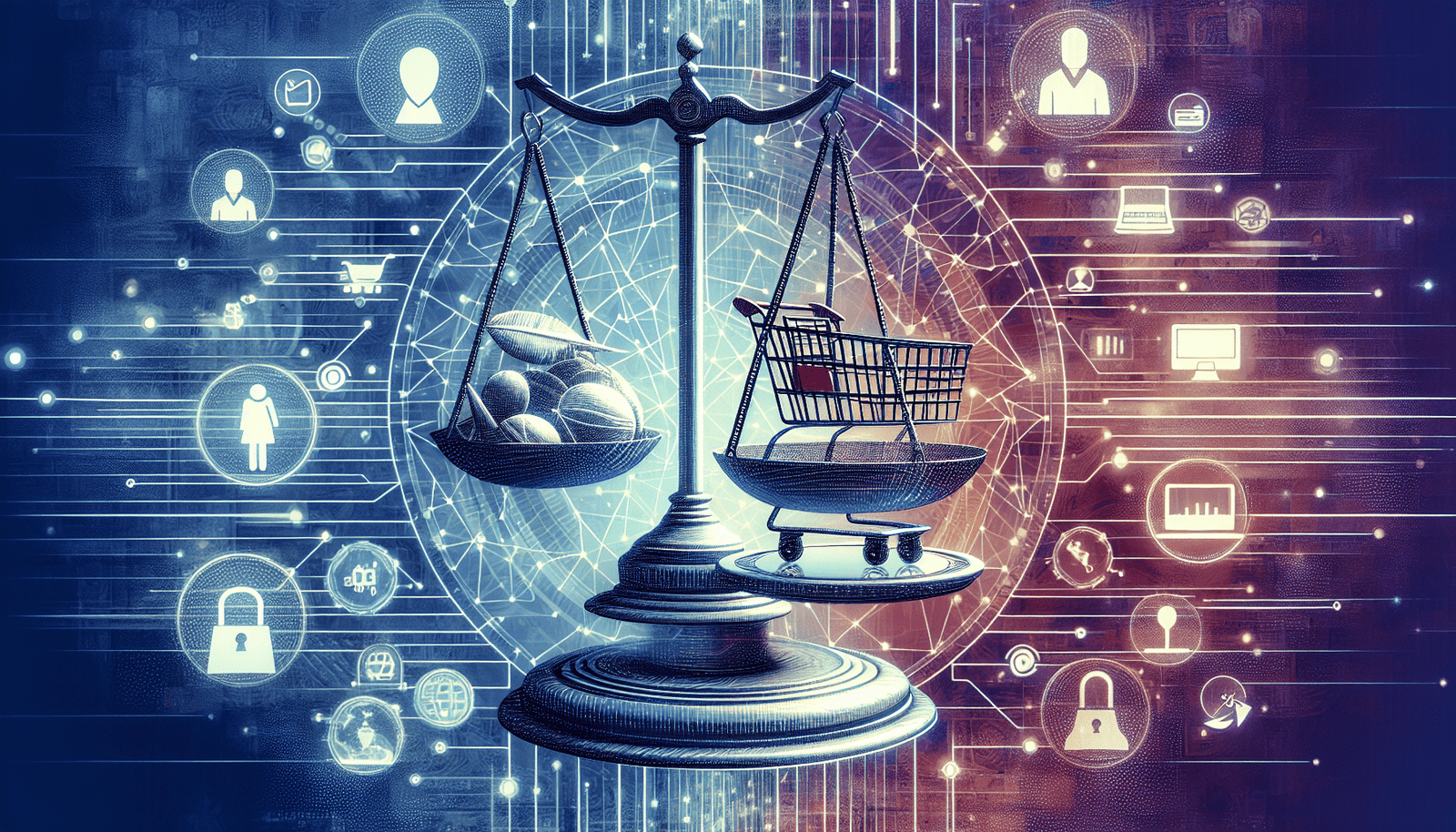In an ever-evolving digital landscape, managing ecommerce platform legal issues requires an intricate juggle of emerging technologies, diverse regulations, and user protection protocols. From ensuring compliance with GDPR to navigating the murky waters of affiliate marketing liability, each legal challenge has its own unique set of circumstances. My experiences as an online seller have taught me that staying ahead of legal pitfalls isn’t just crucial—it’s essential for maintaining trust and long-term success. As you read on, I’ll walk you through some crucial points, sharing insights and practical advice to keep your ecommerce platform legally sound and resilient. Have you ever wondered about the legal challenges that come with running an ecommerce platform? Trust me, it’s not all about setting up a website and waiting for the money to roll in. There’s a sea of regulations and legal pitfalls that could catch you off guard if you’re not careful. Let’s dive deep into “Managing Ecommerce Platform Legal Issues” and hopefully, by the end of this, you’ll have a firmer grasp of what you’re getting yourself into.

Introduction to Ecommerce Legal Issues
Running an ecommerce business can feel like navigating a complex maze. There’s a need for vigilance and awareness to sidestep the numerous legal challenges. It’s essential to understand these issues and manage them effectively to maintain a seamless operation.
Why Legal Issues Matter in Ecommerce
Legal troubles in ecommerce aren’t just about paying fines or facing lawsuits—though, believe me, those are no picnic. They also affect your reputation and customer trust, which are crucial for business success. One moment you’re the trusted seller of artisanal dog bow ties, and the next, you’re a cautionary tale at entrepreneurial meetups.
Key Legal Issues Faced by Ecommerce Platforms
We’ll cover several noteworthy legal areas that you should keep in mind when managing an ecommerce platform. These include product liability, data privacy, payment processing security, and many more.
Ecommerce Product Liability Insurance
Picture this: you’re selling a kitchen gadget that turns avocados into magic guacamole, but one day, a customer claims it turned their avocado into a finger-cutting implement. That’s where product liability insurance comes into play. It protects you against claims of injury or harm caused by products you sell. Don’t skimp on this insurance; it’s worth every penny.
Online Marketplace Liability Cases
Operating an online marketplace involves dealing with vendors from all over the globe. This setup can lead to tricky legal scenarios. You must ensure that vendors comply with your platform’s standards to avoid potential lawsuits. Remember, a widely-loved platform can quickly become a legal nightmare if you overlook vendor vetting.
Online Store Regulations Compliance
Regulations governing online stores vary by country. Some places have stringent rules, while others can be more lenient. For instance, European regulations like GDPR (General Data Protection Regulation) are pretty strict about user data. If you’ve experienced the thrill of receiving a GDPR notice, you know exactly what I’m talking about.
Payment Processing Security Risks
Handling payments is like juggling chainsaws—one wrong move and you’ll be in a world of hurt. Ensuring payment processing security can help avoid innumerable headaches. Look into secure payment gateway providers, and comply with the Payment Card Industry Data Security Standard (PCI DSS).
Emerging Legal Concerns in Ecommerce
Technology evolves, and so do the legal issues attached to it. Here’s a look at some emergent legal concerns in ecommerce.
Autonomous Vehicle Liability Laws
If your ecommerce platform relies on autonomous vehicles for delivery, brace yourself. Laws regarding autonomous vehicle liability are evolving faster than you can say “self-driving car.” It’s crucial to stay ahead of the curve and understand the implications here.
IoT Device Liability Claims
IoT devices can be as effective as they are risky. From smart fridges to connected home security systems, these devices pose unique liability concerns. Imagine dealing with a lawsuit because someone’s smart toaster malfunctioned and started a neighborhood fire!
Blockchain Smart Contract Disputes
Smart contracts on blockchain present an entirely new set of legal headaches. These are usually subject to the laws of the jurisdiction where the blockchain nodes operate. So, understanding these contracts and the legal implications involved is more important than ever.
Online Content and Intellectual Property
Content is the bedrock of ecommerce platforms, but it comes with its set of legal challenges. Let’s delve into some of the more pressing issues you could face.
Website Third-Party Liability Issues
Integrating third-party services can enhance functionality but can also open the door to liability. For instance, if a third-party plugin causes a data breach, guess who’s in the hot seat? That’s right, you.
Website Privacy Policy Compliance
Having a clear, comprehensive privacy policy isn’t optional; it’s a necessity. It should inform customers about the data you collect and how you use it. One slip-up here, and you’re looking at hefty fines and legal repercussions.
Social Media Influencer Marketing Regulations
Social media is great for marketing, but beware! Influencers and endorsements must comply with FTC (Federal Trade Commission) regulations. Ensure influencers disclose sponsored content to avoid misleading consumers.

Online Marketing and Advertising Laws
Marketing is crucial for an ecommerce platform, but it’s a minefield of potential legal issues. Here’s what you need to keep in mind.
Cyberbullying Legal Consequences
Cyberbullying can tarnish your brand and result in serious legal trouble. Implement policies to monitor and address online harassment on your platform promptly.
Social Media Trademark Infringement
Be vigilant about the use of trademarks on your social media channels. Unauthorized use can result in legal action from trademark owners. Think before you hashtag!
Online Defamation Legal Cases
Online reviews are great until they’re not. Address defamatory reviews swiftly, but tread lightly. You do not want to face a defamation lawsuit. A polite but firm response strategy often works best.
Operational Legal Requirements
Operational aspects of your ecommerce platform can bring about their own set of legal concerns. Here’s how to maneuver through them.
Website Accessibility Lawsuit
Ensuring your website is accessible isn’t just the right thing to do—it’s the law. Non-compliance with ADA (Americans with Disabilities Act) can land you in hot water. Use accessibility testing tools to ensure your site meets the required standards.
Website Content Legal Issues
The content on your website should be original and free from copyright infringement. If you’re using third-party content, make sure you have the proper licenses. This will keep the copyright trolls at bay.
Employee Social Media Policy Guidelines
Your employees represent your brand, even on their personal social media accounts. A clear, enforceable social media policy can prevent PR disasters and legal consequences.
Data Security and Privacy
Data security is paramount, especially when dealing with sensitive customer information. Not managing it properly can result in severe legal repercussions.
Website Data Breach Liability
Data breaches are every ecommerce owner’s worst nightmare. The liability fallout from such breaches can be overwhelming. Implementing robust security measures and having a response plan can save you from major legal troubles.
Secure Payment Gateway Providers
Opt for secure payment gateway providers to ensure safe transactions. This not only secures your customer’s data but also instills trust in your platform.
Cybersecurity Insurance for Small Businesses
Cybersecurity insurance can cushion the financial blow from a cyber attack. It’s an often-overlooked aspect that can be a lifesaver when things go awry. Consult with insurance providers to find the best plan for your needs.
Managing Platform-Specific Legal Issues
Legal challenges can vary based on the specific type of ecommerce platform you operate. Here’s a detailed look at some platform-specific issues.
Ecommerce Liability for Dropshipping
Dropshipping can simplify operations but complicates liability. When a product fails to meet standards, the responsibility can be a hot potato passed between you and your supplier. Clearly outline liability terms in your contracts with suppliers to avoid this.
Online Marketplace Seller Protection
Protecting your sellers from fraudulent buyers can enhance your marketplace’s reputation. Develop clear dispute resolution processes and buyer-seller protection measures.
Online Store Age Verification Requirements
If you sell age-restricted products, age verification is not negotiable. Failing to implement this can lead to severe penalties and even the shutdown of your operations.
Innovative Technologies and Their Legal Implications
Innovative technologies bring about a new set of legal challenges. Staying informed and prepared can save your business from potential pitfalls.
AI Liability in Healthcare
The usage of AI in healthcare is booming, but so are the associated legal risks. Ensure that your AI complies with stringent healthcare regulations to avoid medical liability.
VR and AR Legal Challenges
Virtual reality (VR) and augmented reality (AR) offer fantastic new opportunities but come with their own set of legal headaches. Issues range from data privacy to injury claims.
Blockchain and Smart Contract Legal Disputes
While blockchain and smart contracts can streamline operations, they’re not immune to disputes. Make sure to fully understand the legal framework surrounding these technologies to avoid unexpected complications.
Social Media and Digital Marketing Legalities
Digital marketing and social media are the lifeline for many ecommerce platforms. However, missteps here can have serious legal ramifications.
Social Media Advertising Regulations (FTC)
The FTC has strict guidelines for social media advertising. Ensure all ads are truthful and not misleading. Misleading claims can lead to fines and damage to your brand’s credibility.
Online Reputation Management Legal Issues
Managing your online reputation can sometimes lead you into murky waters. While handling negative feedback, avoid any actions that could be construed as defamatory or invasive.
Influencer Marketing Disclosure Guidelines
Influencers must disclose any paid partnerships transparently. This isn’t just good practice; it’s the law. Ignoring this can result in fines and damage to both your brand and the influencer’s reputation.
Conclusion
Navigating the legal landscape of ecommerce is no walk in the park. From understanding product liability to ensuring payment processing security, and even managing the legalities of emerging technologies—there’s a lot on your plate. But remember, being proactive about these issues not only saves you from potential legal troubles but also builds a trustworthy and customer-friendly platform.
Feeling a bit overwhelmed? That’s completely normal. The key is to stay informed and consult legal experts when in doubt. So, go ahead and give that ecommerce dream another thought—armed with the right knowledge, you’ll be well on your way to success.



